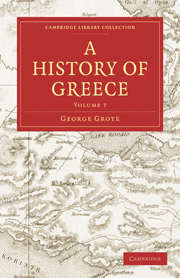Book contents
- Frontmatter
- Contents
- CHAPTER LV From the Peace of Nikias to the Olympic Festival of Olympiad 90
- CHAPTER LVI From the Festival of Olympiad 90, down to the Battle of Mantineia
- CHAPTER LVII Sicilian Affairs after the Extinction of the Gelonian Dynasty
- CHAPTER LVIII From the Resolution of the Athenians to attack Syracuse, down to the First Winter after their Arrival in Sicily
- CHAPTER LIX From the commencement of the Siege of Syracuse by Nikias—down to the Second Athenian Expedition under Demosthenês, and the Resumption of the General War
- CHAPTER LX From the Resumption of direct Hostilities between Athens and Sparta down to the Destruction of the Athenian Armament in Sicily
- CHAPTER LXI From the Destruction of the Athenian Armament in Sicily down to the Oligarchical Conspiracy of the Four Hundred at Athens
- APPENDIX
- Plant section
CHAPTER LVI - From the Festival of Olympiad 90, down to the Battle of Mantineia
Published online by Cambridge University Press: 29 August 2010
- Frontmatter
- Contents
- CHAPTER LV From the Peace of Nikias to the Olympic Festival of Olympiad 90
- CHAPTER LVI From the Festival of Olympiad 90, down to the Battle of Mantineia
- CHAPTER LVII Sicilian Affairs after the Extinction of the Gelonian Dynasty
- CHAPTER LVIII From the Resolution of the Athenians to attack Syracuse, down to the First Winter after their Arrival in Sicily
- CHAPTER LIX From the commencement of the Siege of Syracuse by Nikias—down to the Second Athenian Expedition under Demosthenês, and the Resumption of the General War
- CHAPTER LX From the Resumption of direct Hostilities between Athens and Sparta down to the Destruction of the Athenian Armament in Sicily
- CHAPTER LXI From the Destruction of the Athenian Armament in Sicily down to the Oligarchical Conspiracy of the Four Hundred at Athens
- APPENDIX
- Plant section
Summary
B.C. 419. New policy of Athens, attempted by Alkibiadês.
Shortly after the remarkable events of the Olympic festival described in my last chapter, the Argeians and their allies sent a fresh embassy to invite the Corinthians to join them. They thought it a promising opportunity, after the affront just put upon Sparta, to prevail upon the Corinthians to desert her: but Spartan envoys were present also, and though the discussions were much protracted, no new resolution was adopted. An earthquake—possibly an earthquake not real, but simulated for convenience—abruptly terminated the congress. The Corinthians,—though seemingly distrusting Argos now that she was united with Athens, and leaning rather towards Sparta,—were unwilling to pronounce themselves in favour of one so as to make an enemy of the other.
In spite of this first failure, the new alliance of Athens and Argos manifested its fruits vigorously in the ensuing spring. Under the inspirations of Alkibiadês, Athens was about to attempt the new experiment of seeking to obtain intra-Peloponnesian followers and influence. At the beginning of the war, she had been maritime, defensive, and simply conservative, under the guidance of Periklês. After the events of Sphakteria, she made use of that great advantage to aim at the recovery of Megara and Bœotia, which she had before been compelled to abandon by the Thirty Years' truce—at the recommendation of Kleon. In this attempt she employed the eighth year of the war, but with signal ill-success; while Brasidas during that period broke open the gates of her maritime empire, and robbed her of many important dependencies.
- Type
- Chapter
- Information
- A History of Greece , pp. 84 - 161Publisher: Cambridge University PressPrint publication year: 2010First published in: 1850

